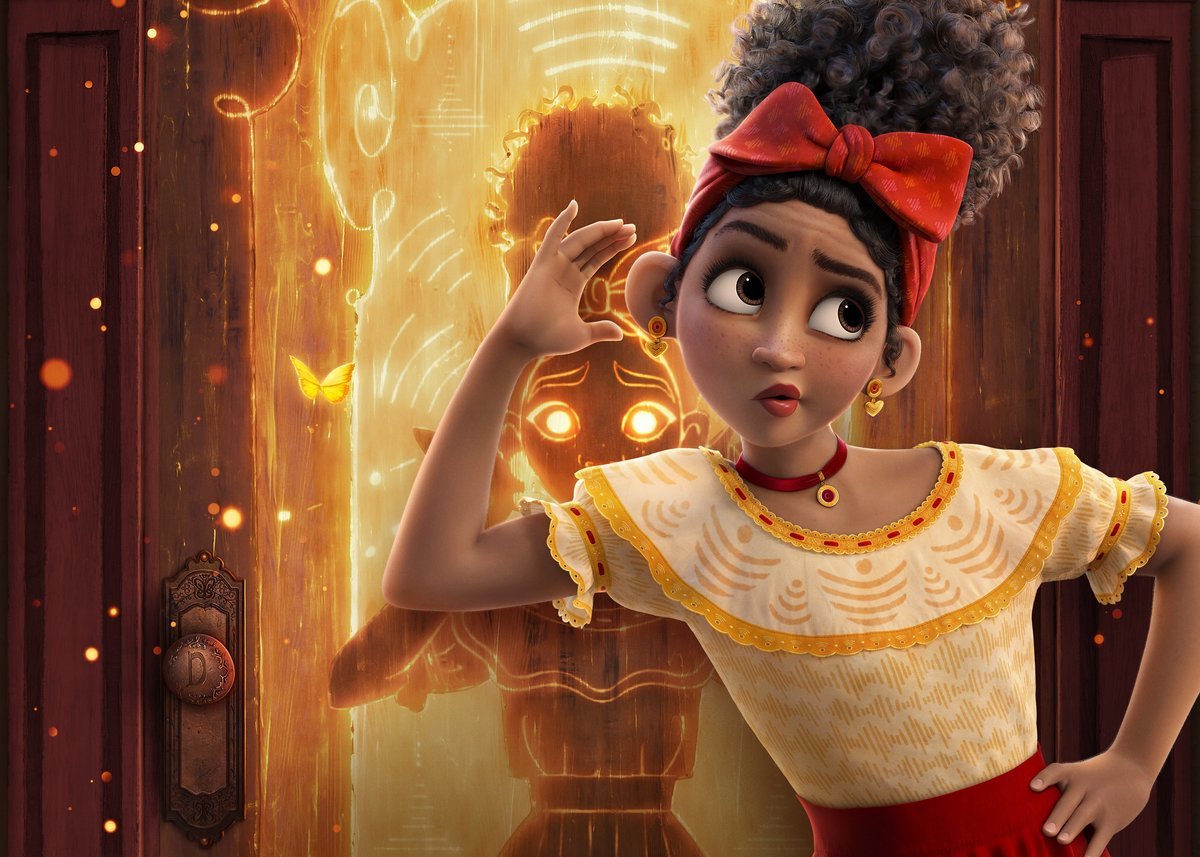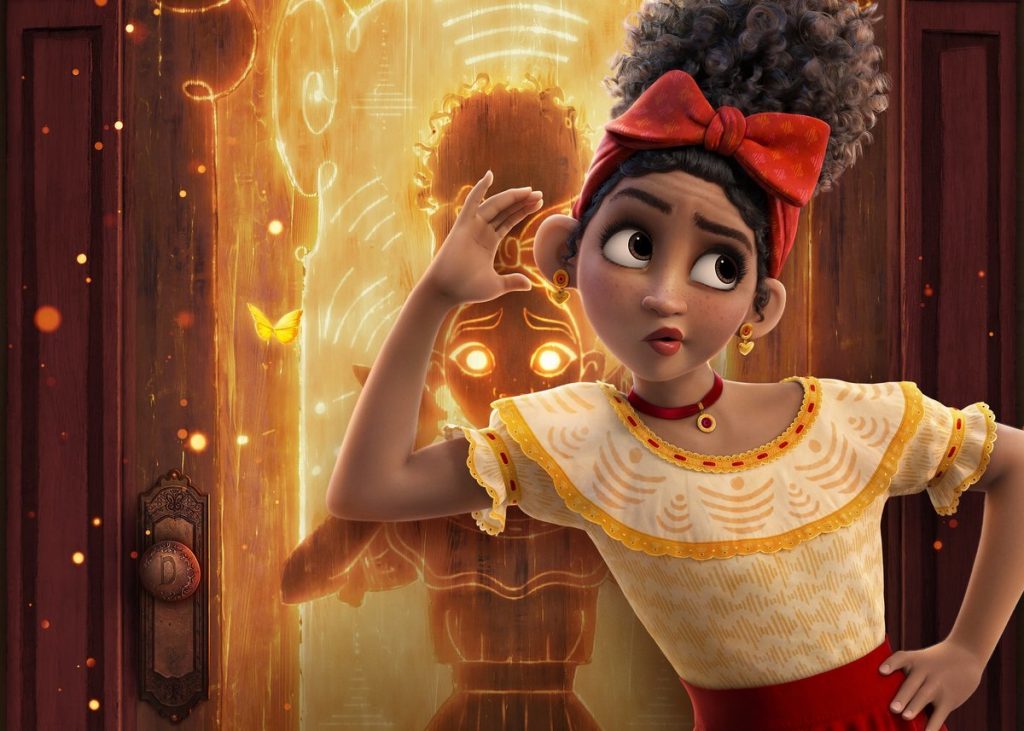

He who sees something good in a thing is almost always right; he who sees only bad is almost always wrong. With these sage words in mind, I try whenever possible to review films I suspect I might like, and to be honest, walking into Disney’s latest theatrical release felt like a stretch.
For a while now I have felt critical of what has seemed Disney’s overall sugar-coating approach to the real character of human existence. A spoonful of sugar might help the medicine go down, but when there is no medicine involved, all we get is candy.
In other words, it has seemed to me that the House of Mouse could rightfully be accused of hawking falsity in the name of fantasy: come and enter our colorful little worlds of film and amusement park only to escape the real world for a while.
Come be happy at the expense of reality.
At first blush, Encanto – whose Spanish title translates “place of enchantment” – would seem to encapsulate this approach to a tee. What the film delivers, though, is the promise at the heart of fantasy at its best: not an escape from reality, but a route, however indirect, into its most beautiful and elusive truths.
The setup of the film is simple, almost silly. Far away in a secluded Colombian valley there is a magical house, each member of whose resident family commands some magical power: superlative strength, effortless grace, the ability to heal any ailment through down home South American cooking, etc.
It feels at first like a flimsy excuse for yet another brand-faithful glimpse into a cooker cutter, geo-diverse, shadowless land of lucrative make believe.
Yet the first hints of a deeper kind of magic enter the scene with the one member of the fantastical household, Mirabel, who has no special gift.
To convey the profundity of what follows with a minimum of spoilers, suffice it to say that Mirabel’s dramatic interactions with the more conspicuously gifted members of her family offer an extended meditation upon the paradoxical way in which weakness can turn out to be its own kind of gift.
(Spoilers from this point)
For example, one of Encanto’s most impressive insights occurs in the conflict between Mirabel and the matriarch of the family, Abuela Alma. When cracks begin to appear in the enchanted house as well as in each family member’s magical abilities, the unmagical Mirabel increasingly becomes the target of her grandmother’s determined efforts to protect her loved ones from any kind of harm.
As the “disabled one” in the family, Mirabel comes to represent – and even become labeled the cause of – its vulnerability.
With no patience for any sort of suffering among those she cares about, Abuela scapegoats Mirabel, and this relationally calamitous rejection of her granddaughter turns out to tie back to another calamity earlier in the old woman’s life.
Like many grandmothers, Abuela once had a husband, yet unlike many, hers was murdered while defending her and their children from harm. This self-sacrifice, we discover, is the source of the magic now found among his descendants, their house, and the mountains which spontaneously sprang up around them as shields from the perils of the outer world.
After the family magic fractures, though, Mirabel flees through the corresponding splits in these protective mountains, and “out there,” in the dangerous outside world beyond the borders of the secluded world of enchantment, Mirabel and her abuela meet again and enjoy their most intimate conversation.
Her grandmother’s severe attitude towards weakness, Mirabel learns, stems from her own experience of suffering and expresses that paradox of great pain whereby it sometimes endow its victims, at the same time, with a great capacity and total intolerance for further hardship.
In her own person, Abuela might be able to put up with more discomfort than many, as nothing will be worse than what she experienced already. At the same time, because what she experienced was so terrible, she exerts the full force of her being to prevent anything like it reoccuring in the lives of those she holds dear.
An unanticipated side effect of the latter, though, is a refusal to countenance anykind of imperfection among these same persons. What originates as a fierce, uncompromising affection in the giver inflicts its own kind of hardship upon the receivers, precisely by trying to eliminate from them the vulnerability at the root of her own pain.
In this context, Mirabel’s “disability” proves a counterintuitive kind of gift.
Unable to pretend she has no need for aid from others, Mirabel stands not merely as an icon of the imperfection that is part of every human life, but also, more positively, our interdependence.
“Blessed are the poor … the meek … the hungry,” in part, perhaps, because such persons invite all men and women into a deeper recognition of the reality of their identities before God and other men. Created in the image and likeness of divine persons who do not merely have relationships but are relations, every man needs other persons simply to be the person he is.
At the same time, every woman who loves someone with a lasting disability must learn not only to remain open and engaged with the uncomfortable, inconvenient, and chronically unresolved aspects of our shared human situation, but also to discover in that person an ongoing invitation to come to terms with her own, perhaps less obvious, weaknesses, dependence, and need.
Like cracks in our proverbial protective mountains, our inabilities not only open inroads for the agonies of the dangerous outside world, they also create the space for truly personal encounters and, accordingly, real intimacy.
A few weeks ago I attended an academic conference on the topic of human dignity, one of the most striking features of which was the way a few parents of children with cognitive disabilities spoke on the subject. For these highly gifted, eloquent intellectuals, living with weakness, dependence, and need was not merely a topic of theoretical interest.
They knew about it, because they lived it.
Walking away from these conference papers, I was struck not so much by the details of the presentations as the luminous compassion of the presenters. The heartiest recommendation I can make for Encanto is that the “enchanted place” opened up by its fantastical imaginary world offers a vista upon the same truly magical territory.
For some time now I have been suspicious of the sort of “Disney-fyings of reality” produced by the animation titan, but if this is the sort of fantasy we might expect from future features – imagination deployed not as a diversion from the real world, but as a means of more profoundly appreciating what makes life in it meaningful – these just might turn out to be the earliest days of its latest fan.
